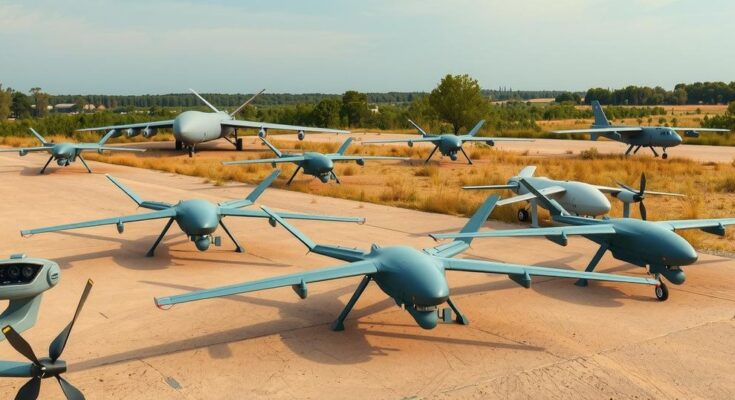North Korea is preparing to export military drones to adversaries like Iran, amid increased drone production efforts. Despite international sanctions, the regime is enhancing its military capabilities while attempting to strengthen foreign relations and secure revenue. Potential recipients include Iran, Syria, and Russia, with clandestine shipping methods employed to evade detection.
North Korea is set to supply military drones to various U.S. adversaries, including Iran, amid increased drone production efforts. In spite of ongoing international sanctions imposed to restrict its arms trade, the Pyongyang regime is prioritizing the enhancement of its military capabilities, aiming to bolster foreign relations and secure additional revenue.
Kim Jong Un has mandated the North Korean government to fully develop drone production. This move is part of a broader strategy to solidify relationships with a limited number of international partners while attempting to circumvent sanctions set to limit its nuclear and missile programs.
Recent reports indicate North Korean authorities began inspecting drones for export on March 7, with shipments planned for those that pass inspection. Potential recipients include Iran, Syria, Houthi rebels in Yemen, militant factions in Africa, and potentially Russia, the latter allegedly having already received significant quantities of North Korean arms.
Drones are produced in a facility located in North Pyongan Province and include types such as reconnaissance and loitering suicide unmanned aerial vehicles (UAVs). Authorities plan to minimize international observation by shipping UAV components separately to be assembled at destination locations, a tactic utilized in previous exports.
Additionally, the regime is adopting untraceable payment methods, such as cryptocurrencies, along with operating through front companies to streamline the payment process and further obscure transactions.
Vann Van Diepen, a former U.S. State Department expert, commented on the competitive pricing of North Korea’s drones, questioning whether they could effectively compete with established non-Western suppliers. He noted the uncertainty of their technological capabilities relative to other options available in the market.
The ramifications of these drone shipments remain uncertain, particularly in regard to international response. The recent dismantling of the U.N.’s North Korea sanctions review panel by Russia may undermine enforcement actions, potentially facilitating Pyongyang’s ability to expand its arms exports without facing significant obstacles.
In summary, North Korea is advancing its military drone production and planning to distribute these drones to adversarial nations, including Iran and possibly Russia. This effort not only aims to strengthen international alliances but also to generate foreign currency. The consequences of these developments could affect global security dynamics, particularly given the potential easing of enforcement against Pyongyang’s arms trades due to diplomatic changes within the U.N.
Original Source: www.newsweek.com




